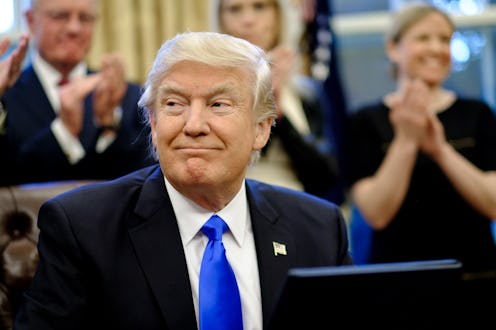News
7 Troubling Trump Stories You Probably Missed

Donald Trump's first week as president of the United States sparked no shortage of controversies, protests, federal lawsuits, and general distress among the American public. While some of Trump's executive actions, like his immigration ban and his reinstatement of the Global Gag Rule, remained the subjects of headlines for days, some of his other moves, which arguably have just as much influence on the country's future, snuck under the radar. These are stories we must pay attention to during Trump's second week in the White House — really, during the rest of his time there.
In a post titled "The Immigration Ban is a Headfake, and We’re Falling For It" for his blog, Jake Fuentes, CEO of Level Money, wrote about his concern that the Trump administration could possibly be intentionally distracting us all by signing extreme executive orders bound to spark widespread outrage. What the administration might actually be doing, Fuentes speculates, is "deliberately testing the limits of governmental checks and balances to set up a self-serving, dangerous consolidation of power."
He goes on to argue that while the public is busy protesting and fighting executive orders that the president and his surrogates knew had little chance of surviving, the administration inconspicuously changed the way Washington works in order to suit Trump's agenda.
Whether or not this is something President Trump and his team are doing intentionally, the result of an authoritarian presidency are very possible if everyday Americans aren't aware of certain stories. These seven stories might have gone under the radar, but they deserve your attention now:
1. Shaking Up The National Security Council
One of Trump's executive orders included a significant reorganization of the National Security Council. Not only did Steve Bannon, Trump's chief strategist and assistant, get elevated to be included into meetings of the council, but the Director of National Intelligence and the Chairman of the Joint Chiefs of Staff were also downgraded — now they will only attend meetings "where issues pertaining to their responsibilities and expertise are to be discussed."
Sen. John McCain spoke out about his concerns regarding this new organization of the NSC. "The appointment of Mr. Bannon is something which is a radical departure from any National Security Council in history," he said on Face the Nation. "The role of the chairman of the Joint Chiefs of Staff has been diminished, I understand, with this reorganization. The one person who is indispensable would be the chairman of the Joint Chiefs of Staff, in my view. So it’s of concern, this 'reorganization.'"
2. Forbidding Agencies From Talking To The Press
Multiple reports from sources in the Environmental Protection Agency, the U.S. Department of Agriculture, the Department of Health and Human Services, and the Department of Transportation revealed that the president's administration had enacted media bans on their agencies. Employees were instructed not to speak to the press and not to use their department's official social media accounts. According to the Associated Press, the EPA was also ordered to submit all scientific studies to Trump's staff for review prior to releasing the information to the public. This kind of action effectively allows the president to control any information that might put holes in his agenda.
3. Freezing The EPA's Grants
The new administration froze the EPA's grants program, putting a stop to environmental research and a long list of projects aimed at improving the environment. While the freeze was lifted on Monday, the decision is still concerning for an agency whose regulations Trump finds burdensome and detrimental for businesses.
4. Purging Of State Department Officials
Trump asked four of the State Department's top officials to resign: Undersecretary for Management Patrick Kennedy, Assistant Secretaries for Administration and Consular AffairsMichele Bond and Joyce Anne Barr, and Director of the Office for Foreign Missions Gentry Smith. Initial reports stated that the officials had resigned unprompted, however it was later discovered that the four staffers had been sent letters informing them that their services were "no longer required." All of people in question were not supporters of Trump. With their positions vacant, the president's administration can now implement others more convenient for their needs.
5. Taxpayers Will Pay For The Wall
One of Trump's biggest campaign promises was the construction of a massive wall along the U.S.-Mexico border — which Mexico would pay for. Trump continues to insist that Mexico will pay for it at some point down the road, after Americans pay to get the wall started, despite the Mexican government's repeated refusal. While Trump's executive order calling for the "immediate construction" of his wall got a lot of attention for its implications for immigrants, not enough attention was given to Trump's continuing lies to his supporters.
6. Defying Federal Court Orders
If federal laws are already starting to be ignored by members of the Department of Homeland Security, it doesn't bode well for the future.
7. Excluding Convenient Countries From Immigration Ban
Trump and his team argue that recent banning of refugees and visitors from seven predominantly Muslim countries because of these nations' "high risk" in fostering and sending terrorists to the United States, despite the fact that few to no terrorists who've attacked the U.S. were originally from the countries in question. However, any country in which Trump ever expressed business interest in was excluded from his executive order. Saudi Arabia, for example, where 15 of the 19 Sept. 11 hijackers were from, was spared from Trump's ban. Trump's company had previously made moves to build a hotel in Saudi Arabia.
All these events, while perhaps not as immediately attention-grabbing as the wall or the protests going on around the world, are extremely important to America's future.